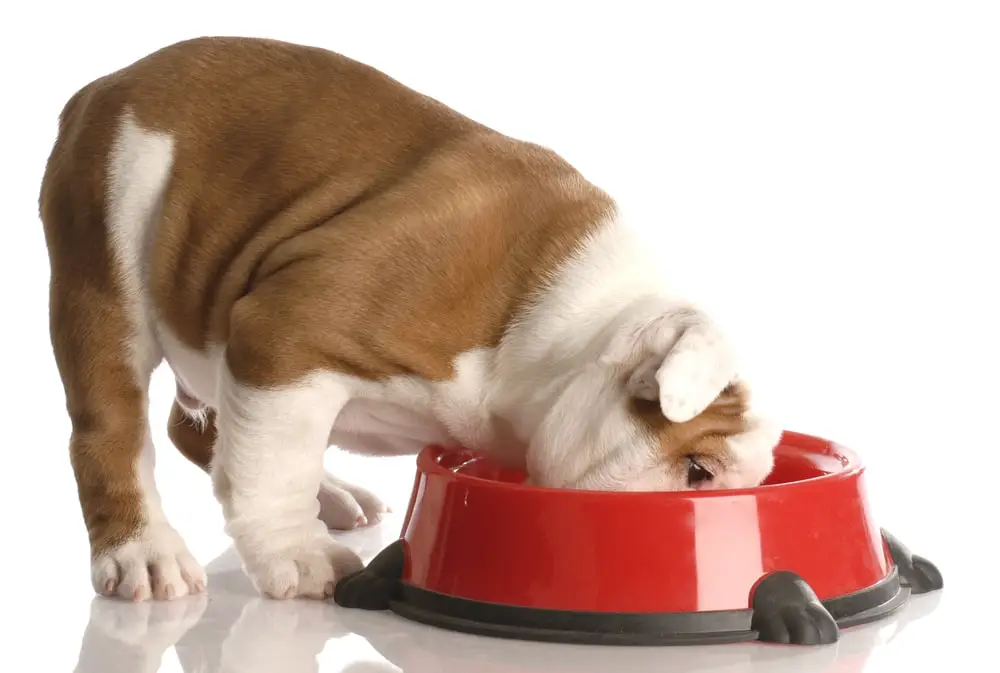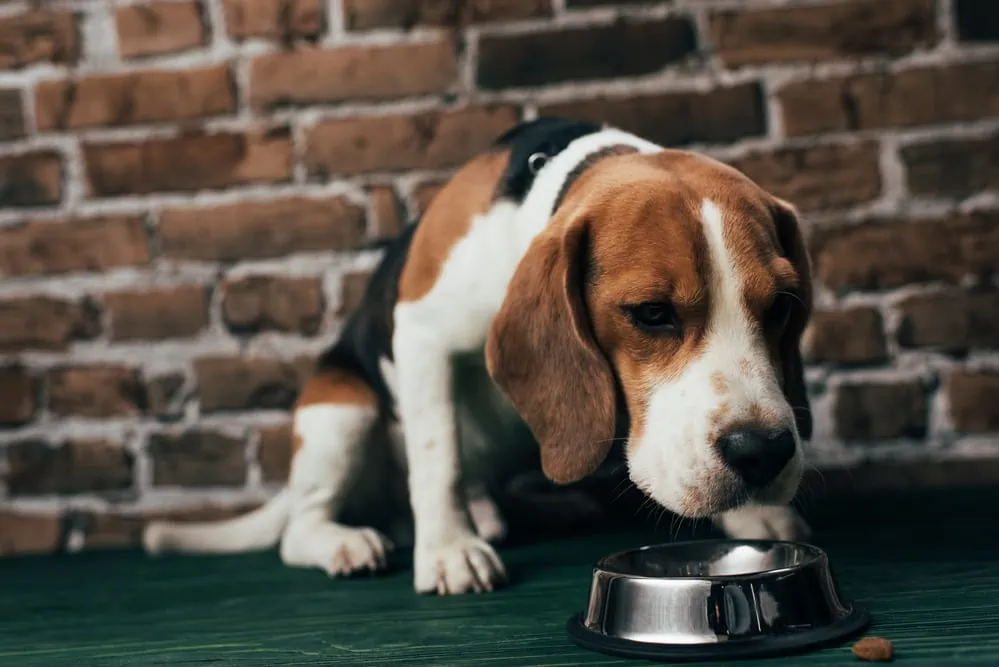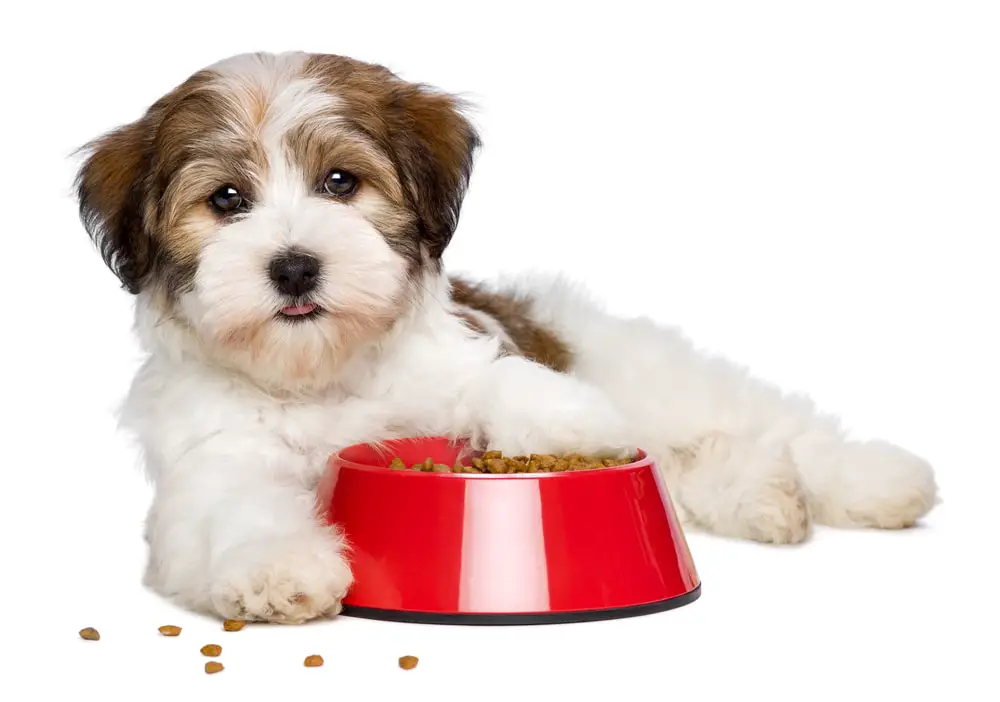As a ‘pawrent’ to multiple animals, you know the grass is always greener – or the pellets tastier – on the other side, and none of your feathered and furred friends can resist getting into each other’s food. Dogs especially are curious and ever-hungry, and they simply love fish food.
But does the sight of a fish food container bearing some very un-fishy tooth marks have to mean a rush to the emergency room and an expensive vet’s bill? Not necessarily.
Can dogs eat fish food? The ingredients in common fish food brands are non-toxic for dogs and there should be no long-term ill effects. In many cases eating fish food probably will not harm your dog. However, it is possible she might have a short-term adverse reaction, or in rare cases, an allergic reaction.
Is Fish Food Toxic to Dogs?

Your dog’s digestive system is much tougher than yours, which is why it can usually handle the grimy water in the pond at the park, or the odd garbage buffet.
But it’s not bullet-proof and there are some surprisingly common human foods that are extremely toxic to dogs (source). So, when your dog gets into food that isn’t intended for her, it’s worth exercising some caution.
However, fish food is one of the more harmless forbidden snacks for your pooch. Most of the ingredients found in common types of fish food are not toxic to dogs and should cause her no harm unless she has an allergy to one of the ingredients. Some dogs do have an allergy to fish, but this is unusual.
In fact, fish is often used as an alternative food source for dogs with chicken allergies, which are far more common (source).
It’s not unusual for dogs to eat fish food – the online forums are full of stories of dogs getting into the goldfish pellets without any long-term health effects. But it’s wise to educate yourself a little about what your dog should and should not be eating, and what to do if she shows signs of food poisoning.
What is Fish Food Made of?
The vast majority of aquarium owners feed their fish pre-formulated pellets or flakes that are readily available at supermarkets and pet shops (source). Like most animal feeds, this food is essentially made up of moisture, fats, proteins, fiber, ash, and nitrogen-free extract (source).
However, fish need more protein and fats than carbohydrates in their diet compared to many animals including dogs, so fish food tends to have higher protein concentration and higher energy density than other animal feeds.
The protein in fish food is traditionally sourced from fish meal and fish oil, often byproducts of other fish industries. Protein is also increasingly sourced from cheaper vegetable proteins such as soy or pea.
Common carbohydrates in fish food include maize meal, rice, and wheat. The cheaper the food, the more likely it is to be bulked up with cheap carbohydrates.
Some fish food contains sex hormones or other additives to enhance the color of ornamental fish, and it’s common to provide medication to fish via their food.
But according to FDA regulations, most fish food has to be clearly labeled with information about its ingredients, nutritional content, precautionary advice and dosage instructions (source) which means you can easily check the ingredients of your specific brand and research any (such as medications) that might pose a risk to your dog.
What is Dog Food Made of?
Dogs are naturally omnivorous, requiring high levels of protein, but also deriving nutrition from vegetables, grains, and fruit.
Like fish, most domestic dogs live off a steady diet of pre-prepared pellets. Commercial dog food is usually a mixture of meat, animal by-products (such as bones and offal), grains and cereals, as well as preservatives, vitamins, and minerals.
Dog food as we know it was invented in the mid-1800s and most brands available today are precisely formulated to provide your dog with her ‘complete’ dietary requirements.
According to US law, if food is labeled complete, it must meet standards set by the Association of American Feed Control Officials (source). For more information about your dog’s dietary requirements, read “My dog eats once per day”.
What Will Happen to my Dog if She Eats Fish Food?
A comparison of the basic ingredients in fish food and dog food should reassure you that they are not so different from each other. This means that if your dog eats fish food, she shouldn’t come to any serious harm.
If she manages to scoff a whole tub of fish food before you catch her, it’s fairly likely that your pup will throw it up again, in the same way, you might vomit after inhaling a whole slab of chocolate in a few seconds flat!
Some dogs may also have mild digestive issues such as a brief spate of diarrhea or loose stool. This is not unusual as any sudden change in food can cause some stomach upset.
None of these symptoms should last long, and none of them should be much cause for your concern. However, be aware that some dogs are more vulnerable than others. Puppies have more sensitive digestive systems than adult dogs, and small dogs can dehydrate quickly from vomiting or diarrhea.
Adult dogs and larger breeds may be better able to handle odd foods. So be aware of the risks and take action if needed.
In very high quantities, fish food may contain too much protein for your dog. Like fish, dogs need high levels of protein in their diets: international guidelines recommend at least 20% protein content in dog food, with no maximum limit (source).
The protein requirement of a dog varies with age, and puppies need more protein for growth. Fish food usually contains about 40-45% protein, however, and is also very high in fat and lower in carbohydrates (source).
This means that in very large quantities, the high protein levels in fish food could cause health issues for your dog. High protein, low carbohydrate diets can lead to obesity, kidney damage, pancreatitis, and other issues.
But as you hopefully aren’t considering replacing her kibble with a bowl or two of fish food every day, it’s unlikely that your dog will eat enough fish food to cause these problems.
In rare cases, your dog may be allergic to fish or one of the other ingredients in fish food. The fish meal in fish food is often a by-product of other industries so there is no way to know what kind of fish it is, even by reading the ingredients.
Chicken, turkey, soy and beef are the most common causes of food allergies in dogs, but it’s best to keep an eye out for signs of an allergic reaction and react appropriately and early.
What Will Happen to my Dog if She Eats Goldfish Food or Betta food?
As an aquarium owner, you know that different fish require different kinds of food, and you might worry that different sorts of fish food might have different effects on your dog as well.
For example, goldfish are opportunistic feeders but mostly herbivores. A Betta fish food diet contains too much fat and protein for goldfish and will cause them to bloat.
Bettas, meanwhile, are mostly insectivores so their food is made up largely of insect larvae. Bettas cannot process the plant matter in goldfish food.
However, regardless of which one she gets her teeth into, neither kind of food should be toxic to your dog.
Be wary of signs she is having an allergic reaction or the possibility that she could be harmed by medication in the food, and follow the guidelines below.
Here are some harmful foods for dogs:
My Dog Ate Fish Food – What Should I Do?

As you now know, there shouldn’t be any need to panic. But it’s best to monitor your dog’s behavior extra-carefully over the next few hours to make doubly sure that the unusual addition to her diet is not causing her any harm.
Look out for signs of food poisoning. A brief spate of vomiting and diarrhea might be expected, but shouldn’t’ be ignored. Call your vet right away if you see this happening.
Further, if your dog is looking lethargic, further steps might be needed.
If your dog’s stomach is upset, make sure she stays hydrated, especially if she is a small dog or a puppy.
Although an allergic reaction is unlikely, keep an eye out for signs such as a rash on her skin, swelling, more scratching than usual, and persistent gastrointestinal upset and act quickly to get her medical care.
If you are in any doubt, take your dog to the vet. It is always better to play it safe than to be sorry later. If you’re not able to get to a vet, or if you’d rather get some more information first, you can also call the ASPCA’s 24 hour National Animal Poison Control Center at (888) 426-4435.
Have the fish food package handy so that you can tell the consultant on the line exactly what your dog has eaten. Be aware that the Center may charge you a fee for advice (source).
Avoid future anxiety by keeping your fish food tightly closed and locked away out of reach of your dog and other pets.
This goes for all pet foods – you don’t want your dog eating your cat’s food or your baby eating your dog’s kibble either.
Related Article: Can Dogs Eat Eggshells? Is it a health hazard for dogs?
Final Thoughts
Although we know something about what dogs can and cannot eat, we often don’t know why a particular food causes harm, or what dosage is toxic.
The easiest thing to do to keep your dog safe is to stick to high quality, scientifically tested dog food. Although it may seem boring to you, good quality kibble is formulated to provide your dog with exactly what she needs.
As difficult as it may be to keep her nose out of other pets’ food, do your best to keep her away from anything except her own kibble.
Many dogs are accomplished thieves, so if your pooch shows a talent for getting into containers that don’t belong to her, take extra steps to stop her by locking them in cupboards out of reach.
Limit treats, and – much as taste tests might be fun for her and you – don’t make a habit of feeding her unusual things like fish food, no matter how much she seems to enjoy it.


0 Comments